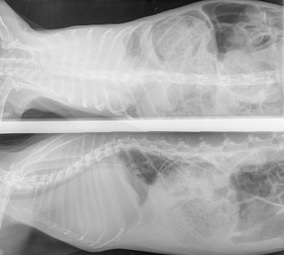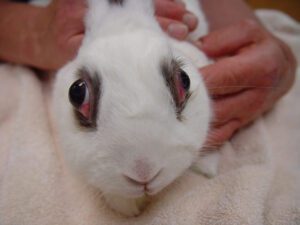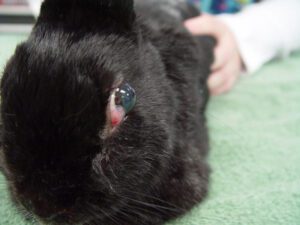by Dr. Maggie Wood
Photos and edited by Susan Horton, DVM
 Heart disease is a significant health concern, and is most commonly seen in older rabbits. In the early stages of heart disease, no symptoms may be present, or subtle changes that are not specific for heart disease such as mildly decreased appetite, lower activity level, or weight loss may be the only signs. As it progresses, an increased respiratory rate is often noticeable. In more advanced stages, the symptoms may be severe including labored breathing, complete loss of appetite, and occasionally fainting. The severe signs are generally seen when the heart cannot keep up with its job of circulating the blood in the body, and therefore fluid backs up in the lungs and/or abdomen. This is called congestive heart failure.
Heart disease is a significant health concern, and is most commonly seen in older rabbits. In the early stages of heart disease, no symptoms may be present, or subtle changes that are not specific for heart disease such as mildly decreased appetite, lower activity level, or weight loss may be the only signs. As it progresses, an increased respiratory rate is often noticeable. In more advanced stages, the symptoms may be severe including labored breathing, complete loss of appetite, and occasionally fainting. The severe signs are generally seen when the heart cannot keep up with its job of circulating the blood in the body, and therefore fluid backs up in the lungs and/or abdomen. This is called congestive heart failure.
If you suspect your rabbit may have heart disease, you should bring him to your veterinarian for an examination. Annual exams are also recommended, even if your rabbit seems healthy. The veterinarian can listen to the rabbit’s heart with a stethoscope to check for an abnormal rhythm or heart murmur. Not all rabbits with heart disease will have a detectable murmur or arrhythmia, but if present, this can alert the veterinarian that there is a problem even if the rabbit is not showing any outward signs. If your rabbit is showing severe signs, such as trouble breathing, this is an emergency and hospitalization with oxygen support is generally needed until the symptoms have improved.
Respiratory infections are common in rabbits and can have similar symptoms to heart disease. It can be difficult to tell which one the rabbit has, especially if the only sign is breathing difficulty, so further testing is often needed. If heart disease is suspected based on the exam, x-rays are usually the first step. An enlarged, rounded heart and fluid in the lungs are common findings with heart disease. If the x-rays indicate that there could be a heart problem, a cardiac ultrasound is recommended. The ultrasound can evaluate the heart function, whether the heart wall is too thick or too thin, and how the heart valves are working. These tests both help to differentiate heart disease from respiratory disease. They also provide a picture of how severe the heart disease is and help the veterinarian decide the type and dose of medications that need to be administered.
Medications for heart disease help to decrease the workload on the heart, control the blood pressure, and keep fluid from accumulating in the lungs. Heart disease cannot be cured, but it can often be managed with medications. This can increase the length and the quality of the rabbit’s life, especially if it is diagnosed before it becomes severe. The rabbit will need to be evaluated regularly to evaluate whether any adjustment is needed in the dose of medication. The dose of medication depends on the individual rabbit and the severity of the heart disease. Bloodwork will also need to be monitored to make sure there are no adverse effects from the medications.


Bulging eyes can be a sign of thymoma and heart disease. Only a complete evaluation including ultrasound can tell the difference.
Of course any time your rabbit stops producing stool, it is considered an emergency! Please call Chicago Exotics at (502) 241-4117 if your rabbit is experiencing stool problems.

